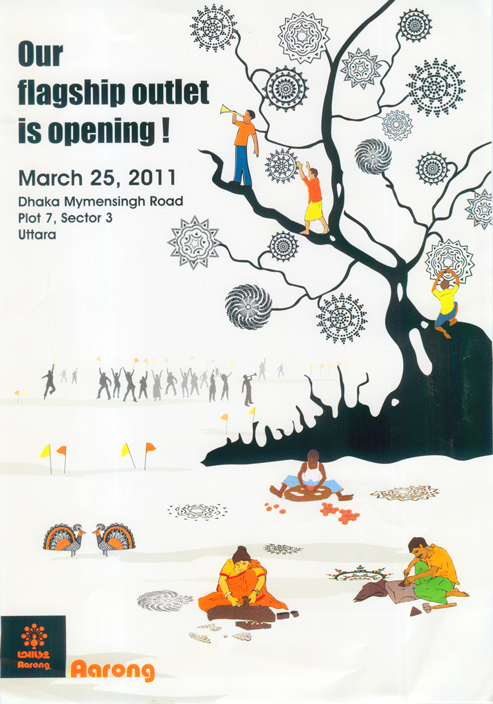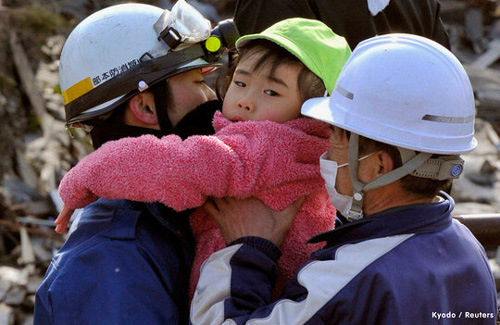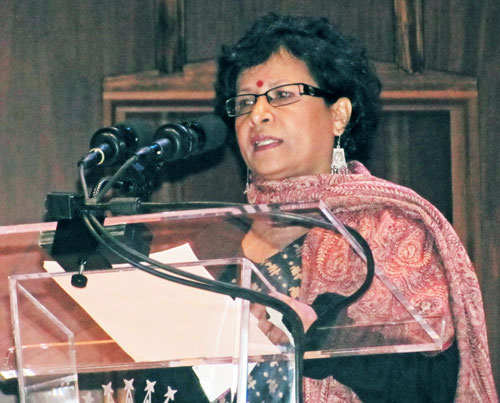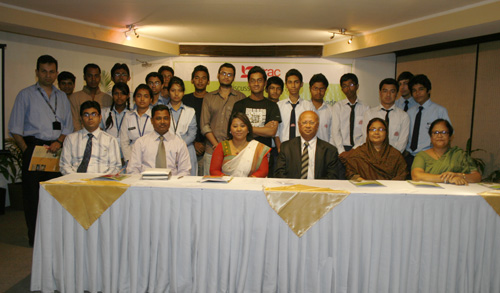
English (961)
Children categories
International Conference on Entrepreneurship and Development
23 March 2011, Dhaka. Entrepreneurship lies at the heart of the development process. Micro-enterprises are now recognised as key means of generating employment and increasing productivity amongst the poorest segments of the society. In view of this perspective BRAC, IGC(International Growth Centre of London School of Economics), and iiG(Improving Institutions for Pro-poor Growth of Oxford University) are going to organise a two-day International Conference on Entrepreneurship and Development: Experience, Practices and Policies on 27-28 March 2011 at BRAC Centre Inn in Dhaka, Bangladesh. The conference will focus on evaluations of current programmes designed to promote entrepreneurship in order to transform the economic lives of the poor. Central to this discussion will be an evaluation of the BRAC ultra poor programme that aims to transfer assets and business skills to the very poor. This programme is being implemented on a wide scale in Bangladesh and its being replicated in a growing number of developing countries. Recent results suggest that it has the potential to become a major tool in the global fight against poverty. The ultra poor model will be discussed in-depth, providing specific insights for policymakers looking replicate its success in other countries. Other presentations will provide new ideas on how constraints on entrepreneurship at the micro-enterprise level can be relaxed, particularly in the areas of training and access to credit.
The conference will also focus on policies to promote entrepreneurship and productivity improvements in larger firms. Presentations will discuss frontier knowledge on how state-level policies, firm capabilities, and trade interact to promote industrial development. There will be a particular focus on how trade policies can engender industrial development and on how the capabilities of firms to innovate and become more productive can be enhanced.
The outcome of the conference will be particularly relevant for developing countries targeting manufacturing and service sector expansion as a means of promoting economic growth, and there will be ample space dedicated to promoting dialogue and exchange of ideas.
Discussion: Government spending on poverty reduction
24 March 2011, Dhaka. BRAC and Centre for Policy Dialogue (CPD) jointly hosted a discussion on “Resources for the Ultra Poor in the National Budget: How Much? How Effective?” on March 23, 2011 at the BRAC Centre Inn Auditorium.
The main objectives of the dialogue were to provide a set of recommendations to increase the efficacy of fiscal measures and public service delivery to the ultra poor, to enhance implementation of existing pro poor policies and identify future policy priority areas for reducing ultra poor in Bangladesh.
Dr. Muhammad Abdur Razzaque, Minister for Food, Disaster Management and Relief was the Chief Guest of the discussion.
Click here to read more: http://www.thedailystar.net/newDesign/news-details.php?nid=178896
Aarong to launch flagship - country's largest store

24 March 2011, Dhaka. Aarong, the country’s leading fashion and lifestyle brand, will open its flagship store on the Dhaka-Mymensingh Road in Sector 3, Uttara on March 25, 2011. At 36,000 sq. ft., the outlet is currently the country’s biggest retail store. Aarong, an enterprise of BRAC, supports the livelihoods of approximately 65,000 rural artisans, of whom 85% are women.
Now in its 32nd year of operation, Aarong began conceptualising the design and building of its flagship store five years ago, in an effort to consolidate its brand image and present itself on a platform of global standards. The flagship store therefore aims to fully capture the Aarong brand and act as a projection of the brand’s positioning.
Every aspect of design, starting with the customised plans for the building to internal layout and decor, has been made to fit international retail industry standards. Visual merchandising elements inside the outlet have been professionally designed following scientific guidelines. Nakshikantha has been chosen as the overall theme for the store, to reflect Aarong’s pioneering role in the revival of this unique Bangladeshi craft.
Spanning the north wall of the building is Aarong’s Tree of Life – in which Aarong’s story is interwoven with the many thousands of stories of the family of artisans. The network of roots and branches of the tree is in fact an image of the rivers of Bangladesh. The motifs that form the tree use unique Nakshi Kantha patterns shaped from natural elements - metal, wood, clay and leather - indigenous to the work of our artisans. The outlet features six levels, each of which highlights one or more of these elements, with dedicated segments for clothing, accessories, leather and metal, books and stationery, toys, household products and much more. New features introduced include an exhibition gallery, a floor dedicated to exclusive product offering, a premium customer lounge and a newly-branded Aarong café in the flagship store.
The outlet will be inaugurated by Sir Fazle Hasan Abed, Founder & Chairperson, BRAC, Muhammad A. (Rumee) Ali, Managing Director, BRAC Enterprises and Tamara Abed, Director, Aarong. Senior officials from Aarong and BRAC will also be present.
Microcredit Summit lauds BRAC
16 March 2011, Dhaka. BRAC in Bangladesh received a certificate of appreciation from Microcredit Summit Campaign (a project of RESULTS Educational Fund). The certificate was presented in appreciation of BRAC’s commitment to the Summit’s goals.
The Microcredit Summit Campaign launched the State of the Microcredit Summit Campaign Report 2011 on March 7, 2011 in Washington, D.C. According to the report, more than 128 million of the world’s poorest families received a microloan in 2009- an all time high. The certificate is a validation of BRAC’s role in this achievement.
BRAC is an active member of the Microcredit Summit Campaign.
Praying for Japan
19 March 2011, Dhaka. As you all know by now, Japan was hit by a 9.0 magnitude earthquake, one of the largest earthquakes ever recorded, on Friday, 11th March, 2011. It also triggered a massive 23 foot (7 meter) ferocious tsunami killing thousands of people, as it swept away boats, houses, and cars, while widespread fires burnt out of control. The earthquake was followed by more than 50 aftershocks so far, many of them more than magnitude 6.0, and reaching up to Hawaii and other US west-coast areas. 
Photo Copyright © Kyodo/Reuters
We join the Japanese in prayer and in sympathy at the losses suffered by its people.
BRAC celebrates International Women’s Day with Storytelling Platform Launch
8 March 2011. On the occasion of the centenary of International Women’s Day on March 8th, BRAC – the largest non-profit in the developing world – joins the global celebration with the launch of Courage in the Heart, an online platform highlighting the stories of amazing women who experienced transformational change. BRAC will also participate in Join me at the Bridge, a collaboration of Women for Women International and Google to celebrate women’s achievements.
In honor of International Women’s Day, Google selected BRAC to be highlighted for its impactful work on behalf of women from a list of thousands of organizations. “I think Google picked BRAC because of our track record in touching the lives of some 138 million women and their families. By helping girls to get educated, we help them realize their dreams. When girls fly, the whole world soars.,” says Susan Davis, President & CEO of BRAC USA.
Courage in the Heart (http://www.brac.net/courageintheheart) – also slated to launch on March 8th – is an online storytelling platform that features the stories of women in rural Bangladesh who are changing the fabric of society by shifting the consensus about the role of women. Courage in the Heart creators Annie Escobar and Patricia Schneidewind traveled to Bangladesh in 2010 to profile the lives of women who have transformed their lives through BRAC’s pioneering programs.
On the launch, Escobar says:
“Courage in the Heart is meant to build solidarity in the fight for women’s empowerment. We hope to create ‘BRAC ambassadors’ by connecting people in the United States to BRAC’s work and further its effort to empower people in situations of poverty, illiteracy, disease and social injustice.”
This platform shares the accounts of women like Rupa, a young woman in Bangladesh, who after being widowed at fifteen changed her life by becoming a community advocate through BRAC’s Human Rights and Legal Services program. Rupa says of her transformation: "before, I was not aware of the legal system, but now I teach a lot of people about the law."
One additional story will be released each week for six weeks following the launch of Courage in the Heart.
To raise awareness of International Women’s Day, Google has launched a marketing campaign intended to drive awareness of women’s achievements by highlighting incredible women organizations that work in the field of economic security, education, empowerment, equality and leadership, health, and safety and the security of women. BRAC was selected to be highlighted from hundreds of organizations for its impactful work educating women.
About BRAC:
BRAC is a global development organization dedicated to alleviating poverty by empowering the poor to bring about change in their own lives. BRAC’s holistic approach aims to achieve large scale, positive changes through economic and social programs that enable women and men to realize their potential. BRAC was launched in Bangladesh in 1972 and today reaches more than 138 million people in Africa and Asia through its programs that address poverty by providing micro-loans, self-employment opportunities, health services, education and legal and human rights services.
Dr. Afsana receives "Woman of Distinction Award 2011"
01 March 2011, Dhaka. Dr. Kaosar Afsana, Associate Director of BRAC Health Programme, has received the " Woman of Distinction Award 2011" from the NGO Committee of the Status of Women, New York in recognition of her leadership in developing countries for empowering women through education, training, science and technology. This event took place in New York on February 22, 2011. Dr. Afsana was invited as a guest speaker to deliver a speech on using mobile technology for empowering women on February 21, 2011 on Consultation Day at the NGO CSW, New York.

Dr. Afsana speaking on Consultation Day at the NGO CSW, New York
Dr. Afsana has been working at BRAC for over 18 years. She is an MD with MPH from Harvard and PhD from Edith Cowan University, Australia.
Currently, she is heading two significant projects of BRAC on maternal, newborn and child health in urban slums and rural districts of Bangladesh and involved in many different activities with BRAC including strategic directions, policy-making and programmatic decisions.
BRAC chairperson recognised in the first ever “Women Deliver 100” list

07 March 2011, Dhaka. In celebration of the 100th anniversary of International Women’s Day, Women Deliver, a global advocacy organisation, announced the “Women Deliver 100” - their list of the hundred most inspiring people who have delivered for girls and women. This list recognises women and men, both prominent and lesser known, who have committed themselves to improving the lives of girls and women around the world.
BRAC founder and chairperson Fazle Hasan Abed is one of the honourees in the list for lifting millions out of poverty throughout Asia and Africa- –particularly women. Abed recognised early on that empowering girls and women is central to alleviating poverty, and women have always provided the backbone of BRAC’s organisation – 98 percent of the borrowers in our microfinance programmes and more than 95 percent of our volunteers are women.
The honourees derive from the fields of health, human rights, politics, economics, education, journalism, and philanthropy, and represent a great diversity of geographic and cultural backgrounds. The 100 honourees were selected from among hundreds of potentials and feature some of the most intrepid, committed, and results-driven people in the world.
For more details visit http://www.womendeliver.org/
Photo Credit: www.womendeliver.org
Statement from BRAC on the recent controversy about Grameen Bank
07 March 2011, Dhaka. On behalf of BRAC, I am expressing my concern at the recent development concerning Grameen Bank. Grameen Bank is an extremely important institution serving almost 8.3 million of Bangladesh’s most underserved population. The welfare of these borrowers and the continuous progress of the institution must be given the highest priority for any decision affecting the organization.
The role of microfinance in ensuring financial inclusion and improving people's lives are well documented. MFI organizations like Grameen Bank, BRAC and various local MFIs that are supported by PKSF have played a very important role in Bangladesh in ensuring this access to finance and enterprise development. BRAC has also played its role by providing additional service support in various other areas such as health, education and agricultural support services through a multi-pronged approach towards tackling poverty.
We must understand that microfinance institutions like Grameen Bank are different from traditional organizations. A big capital of such organizations is the intrinsic community level trust that they have earned. This trust element must not be underestimated. If this trust is lost, then there may be delinquencies, intentional refusal to repay loans or large scale withdrawal of savings by the members -- in effect potentially bringing the organization’s future in jeopardy.
A sudden exit of the founder and the managing director of Grameen Bank and a legal battle between the board and the government may potentially cause a loss of confidence among its borrowers putting the organization’s future in doubt. For the sake of the millions of its members, we must take utmost care in not letting this happen. A carefully planned succession for Dr. Yunus can help a smooth transition and give the organization the stability that it needs to ensure the welfare of its members.
We hope that for any steps concerning Dr. Yunus or Grameen Bank due process will be followed -- keeping in mind the integrity of the institution concerned and also how lack of due process may affect the reputation of our country globally.
We must remember that development organizations play a complimentary and supportive role to the Government in national development. Recent dramatic decline on maternal mortality rate is a great example where such complimentary work can prove tremendously beneficial for the entire country and in effect globally improving the image of the country. Government and the NGOs must continue to work together to achieve the Millennium Development Goals (MDG) for which our Prime Minister recently got acclaimed internationally.
Sir Fazle Hasan Abed,
Chairperson,
BRAC
BRAC facilitates youth discussion session on ultra poor

01 March 2011, Dhaka. ‘Going to the Radisson or Westin for dinner was quite common for me. But now, after visiting the ultra poor areas and seeing those hunger stricken faces, I began to feel a sense of guilt. I am now aware that the cost of one meal at these hotels can buy food for the ultra poor for one whole month. I now feel strongly that I should do something for them’, says Asir Faisal Dipro, student of Udayan High School who went to visit BRAC’s field activities for the ultra poor. Such realisations were reoccurring during the experience sharing in the discussion session on ‘Ultra Poverty Reduction: Views of Future Leaders’.
To create a platform for these young minds to voice their concerns for the ultra poor, a discussion session titled ‘Ultra Poverty Reduction: Views of Future Leaders’ was organised by our Advocacy Unit at the Auditorium of BRAC Centre on February 28, 2011. The event helped bring forth the views of the future leaders in front of a versatile audience.
Mahabub Hosssain, Executive Director, BRAC chaired the session and Sheepa Hafiza, Director, Gender Justice & Diversity and Advocacy moderated the event. The session was divided into two parts. The students along with the Youth Forum who went to the field visit took the floor in the first part to share their experience and views. Students from Dhaka College, Dhaka Commerce Collage, Udayan High School, The New School Dhaka and Dhaka Cantonment Girls Public School & College participated in the session. Galib Ibn Anwarul Azim represented the Youth Forum, a student of Economics Department, University of Dhaka. The theme of the second part was an open floor discussion with active participation of teachers from the respective schools and colleges, BRAC professionals, representatives from development partners, and civil society.
The event was a part of the national level campaign on Advocacy for Ultra Poverty Reduction. Our Advocacy Unit organised several debate competitions at different urban schools and colleges throughout 2010, in order to mobilise urban students who are rarely exposed to the extreme poverty of Bangladesh. They were followed by field visits to BRAC’s Ultra Poor programme areas of Rajshahi and Pabna District.
Join the world’s biggest family




